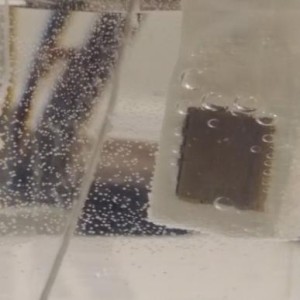
Water splitting into hydrogen on a metal wire and oxygen on the catalyst.
Source: Yale Entrepreneurial Institute
New research out of Yale University, led by Ph.D. student Staff Sheehan, recently unveiled a new catalyst to aid in the generation of renewable fuels.
Sheehan’s main area of research has been water splitting. In his recently published paper, he takes the theories and processes involved in water splitting and uses a specific iridium species as a water oxidation catalyst. This has led to new breakthroughs in artificial photosynthesis to develop renewable fuels.
“Artificial photosynthesis has been widely researched,” Sheehan says, “but water oxidation is the bottleneck—it’s usually the most difficult reaction to perform in generating fuel from sunlight.”
This from Yale Entrepreneurial Institute:
The iridium-based catalyst featured in Nature Communications represents one of two novel methods Sheehan and other Yale researchers have discovered for splitting water in artificial photosynthesis—the other utilizes cobalt. Both have been patented through the Yale Office of Cooperative Research.
While renewable fuels are the ultimate end-goal, Sheehan and a team of Yale researchers also want to use the catalysts for metal refining and for the remediation of chemical waste.
To find out the true potential of hydrogen production and water splitting for renewable energy sources, make sure to attend the 227th ECS Meeting this May in Chicago, IL! Our Plenary Session will feature John A. Turner of the National Renewable Energy Laboratory.


